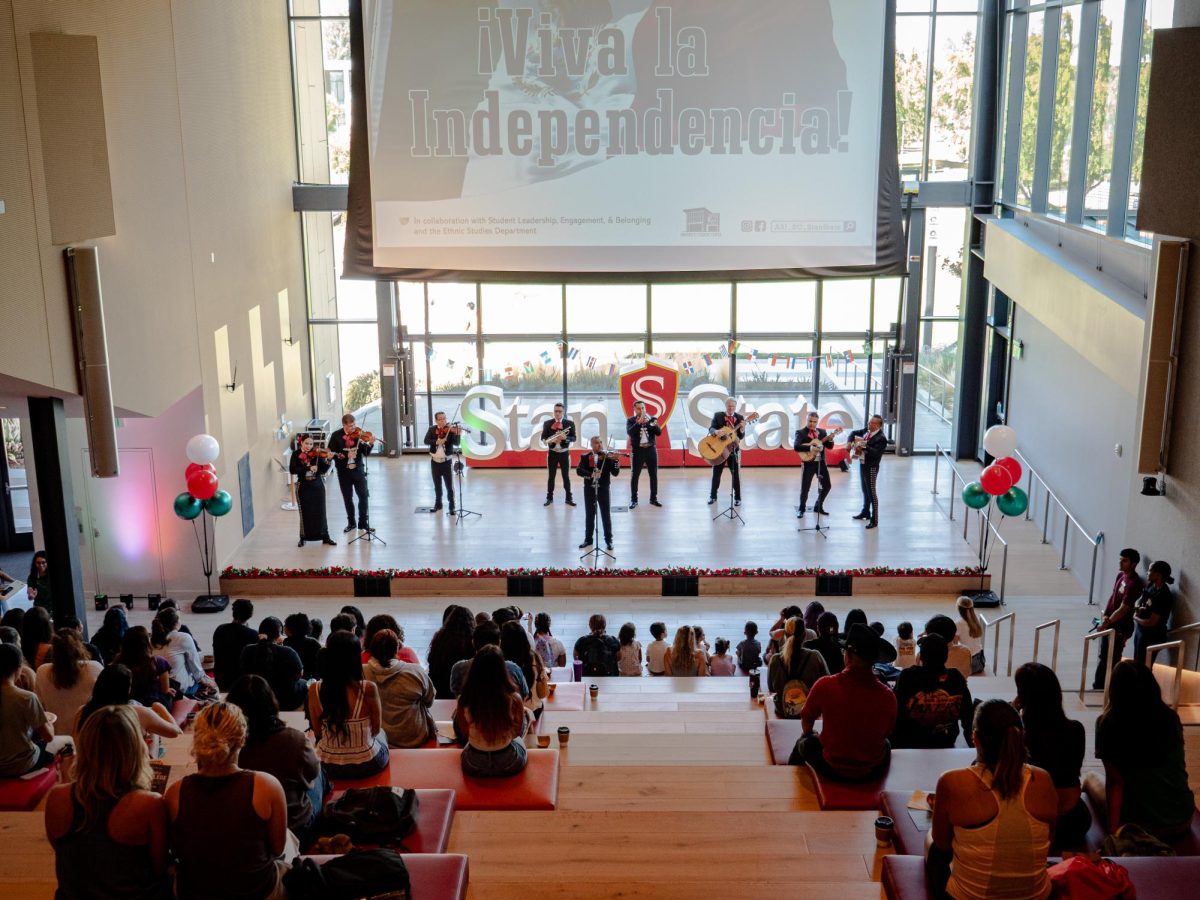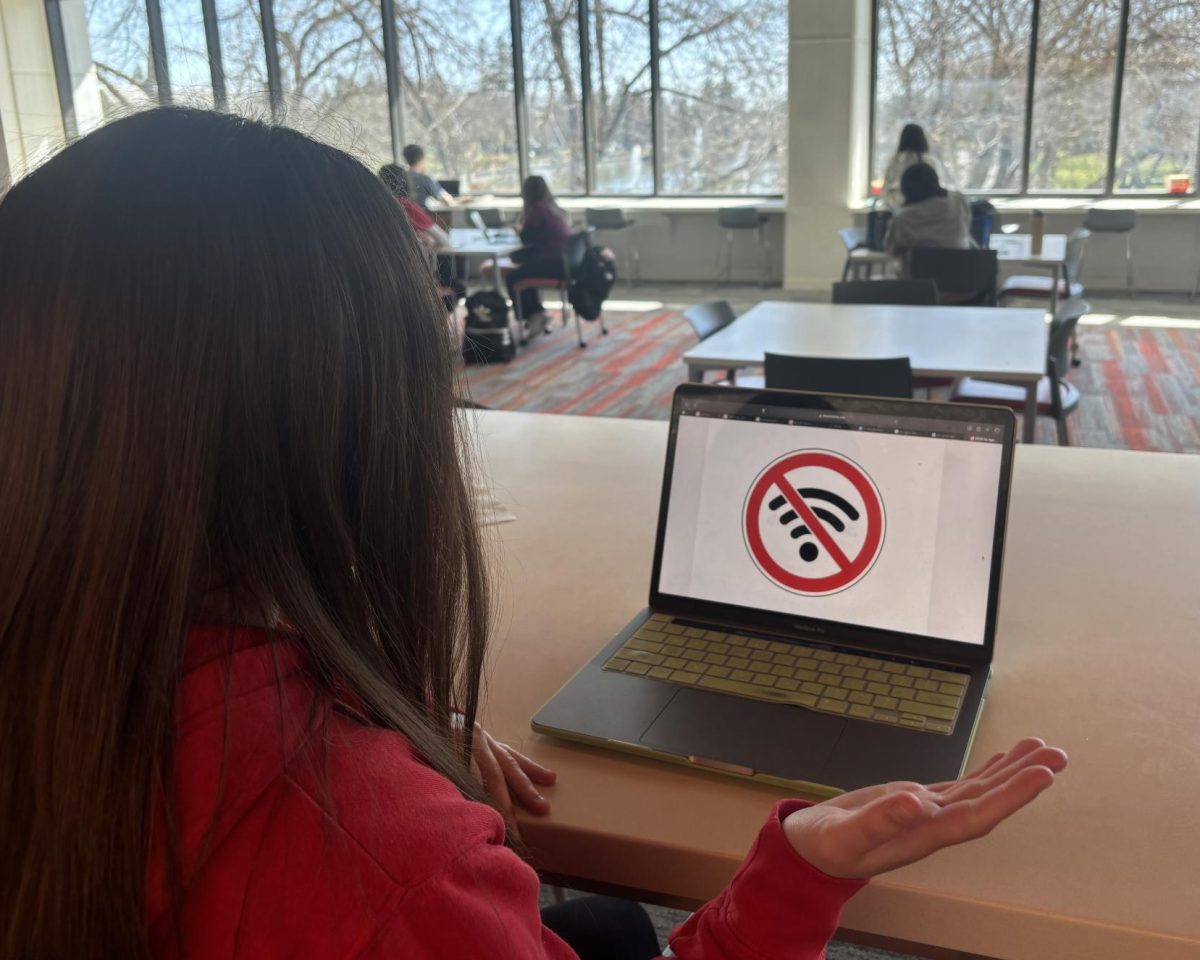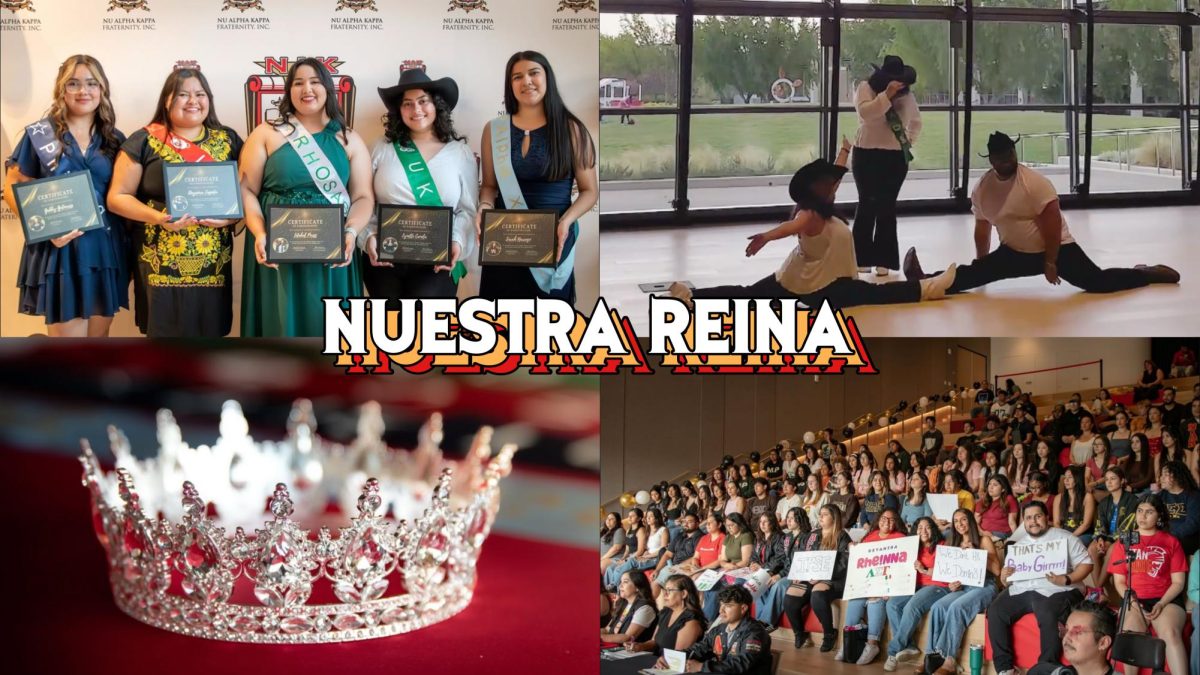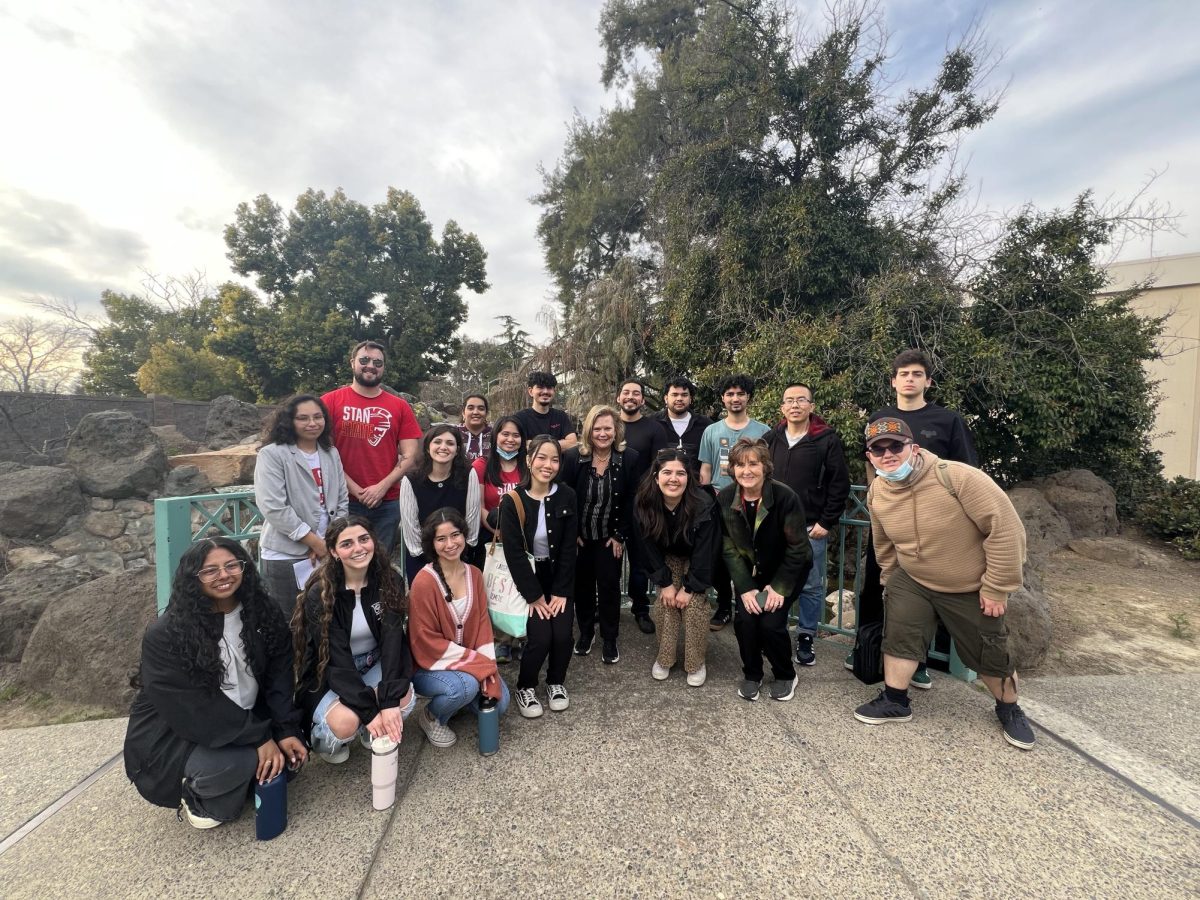Dr. Scott Davis has taught at California State University, Stanislaus since 1999 and is currently the chair of the English Department. The class he regularly teaches is Years of War, Days of Peace, a year-long summit course that he heads alongside Dr. Ian Littlewood, chair of the Physics Department. The class blends humanities with hard science, educating students on the physics behind nuclear energy and nuclear weaponry, as well as how the fear of and deference to them have informed our culture through film and literature.
Dr. Davis also has a pretty extensive and diverse knowledge of music. I’ll let him explain it:
Scott Davis: The story of my life that I tell to myself has a soundtrack. The highs and lows, the every days, are all cued to music, to songs or performances or even simply a rhythm, like a click track. Like most people of my age and background my collection skews toward rock and roll and it is boy-heavy, but it’s pretty expansive overall. I love jazz, especially the small bop-influenced combo work of the late ‘40s and ‘50s (before Miles went electric). My pre-modern work is Bach and Mozart heavy (though I have something by Hildegard of Bingen). I have some techno (just rediscovered Tricky) and hip hop (big old school mostly). My students clue me to more recent projects, but will also remind me of some gaps I’ve missed.
(Editor’s Note: The playlist provided by Dr. Davis is the result of him shuffling his iTunes Library.)
In a lot of ways, the random mix is pretty defining: I’d have picked a few of those if I had to pick. Others are like the right project but I’d have picked a different song. And I can’t believe it picked up Ripon’s own French Cassettes; I love that act! But, like, no Clash? No Bowie? No X? No Plimsouls? No REM? Those acts really defined my youth and the machine has pretty comprehensive collections. No Depeche Mode? C’mon!
So what were the songs you said you might substitute?
SD: Well, I was thinking, looking at The Raval Sessions – which is a great compilation, it was put out, I want to say, maybe 2004, 2005, of all the music that was happening in like the nightlife scene in Barcelona at the time. There were a couple of producers that just kind of went around and collected all of the stuff that was really hot and was coming out of that scene. And it was [this] really eclectic, international group of artists in Barcelona. It was a really vibrant scene, so it was a great testament to that moment. But then that song is like the first song on the first cut on the first disc. And there’s eight, easily eight other songs that I would’ve said, “Oh, that’s a much cooler song, or that’s a much better thing.”
“Motion Picture Soundtrack,” not my favorite Radiohead song. … Not even “Little Shoes” by French Cassettes. I would’ve said “Radley.” But, y’know, I ended up listening to that as I was writing that thing out last night and going, “Yeah, that’s right. That’s a cool song. I like that song.”
Were there other acts from around here, like French Cassettes, that you’re into?
SD: Of Us Giants I guess has put out a new project, but I haven’t listened to it yet. If I was in the business of making a plug, well, y’know, I’ve got to say something about Viva Joaquin, or, The Airlings, or one of the other projects that our people have been involved in. So, Indian Runner. What’s Jay’s band? Table for Five.
Nathan Duckworth: Heaven.
SD: Heaven Burtch? Yeah.
ND: I think pretty much everyone you mentioned – well, I know Heaven and the Airlings and Of Us Giants are all nominated for MAMAs. Madie Boyd –
SD: – Hey, that’s a great project. Holy smokes. And he’s a kid kid. He’s like 16 or 17 years old, and you listen to him play and he’s got a lot of maturity. He’s going to do alright, I think.
How important are lyrics to you in music? I remember one English professor that I talked to about music told me that it was too much work to pay attention to the lyrics because he was always, I mean, it’s his job to pay attention to words.
SD: Yeah. I’ve got to say, I’m of two minds of that. I was so accultured to music in the ‘70s and the ‘80s, to the lyric, and especially to the smart guy lyric, so the stuff that was Elvis Costello, or The Jam, Paul Weller or … Roddy Frame’s another guy from that era. And they’re into wordplay and they’re really into densely structured lyrical stuff. And, so, one-half of me really, really appreciates smart language, and a lot of the stuff coming out of hip hop and the rap community is smart language, right? So I always liked that. And the other half of me remembers why Nirvana and the Pixies were really important, right? That at a certain level it was the sound of the word that mattered way more than some meaning, and y’know, that there’s a an absurdity to it, to assigning too much content.
Even Dylan is absurdist in a number of places. If you take his lyrical stuff to seriously, I think you miss the point sometimes.
What about the multicultural, foreign-language groups you have on here?
SD: Los Lobos, that’s a pretty traditional ranchera, that song. I actually like their work because I pay attention to the tradition. I can still pick up a little bit. I studied Spanish in college, so I can still pick up a little bit of it.
…
That said, some things you listen to, it’s like a song and it’s from some Pakistani kids, and you listen to it because it’s cool. I don’t know Urdu, but it sounds cool. The Kinni Sohni stuff, the Desi culture stuff, I have no idea what they’re saying, but it sounds cool, so I’ll roll with it.
So, you mentioned R.E.M., and, this is more of a personal question, I’ve only really listened to “Out of Time” because it’s what I have, and their popular singles. Where do you start with R.E.M.?
SD: Honestly, I’d start with their first album, “Murmur.” And that comment I made about real smart lyrical content versus the sound of the words being more important, that probably goes back to R.E.M. They did a bunch of stuff with cut up lyrics – where you get a bunch of words and you just put them in pieces on the floor, and you pick them up and try to come up with random phrases out of it. It’s a technique used by William Burroughs, and David Bowie used that in parts of his career. And, y’know, there’s some stuff on there that’s just totally unintelligible. And when we were in college it was kind of a game. You’d try to come up with the best version of “Maps and Legends” or whatever it is because you have no idea what he’s saying, but, “Here’s what the cool version could be.”
But I’d start with the really early stuff because you can hear so much of that early energy that you have.
Who was it? I think it was Richard Hell has a biography or memoir out, came out about a year ago. Richard, who’s played in the Voidoids and was originally part of the group that became Television. He was around for that New York punk scene in the ‘70s. And he was talking about how rock ‘n’ roll is fundamentally, fundamentally, youth culture and anti-authoritarian, which means if it means anything to anybody at anytime, it’s probably not doing its job.
And so the great frontmen in rock history are mostly unintelligent – or unintelligible because you really shouldn’t understand what they’re saying other than “Hey, this is a group situation, and y’know, have fun and break rules, now.” And then, y’know, you get a little bit older and you’re like, well, maybe I can’t break that rule, or I can’t say that I broke that rule, or I don’t want to be reminded that I spent most of my 20s breaking that rule. But that seems to be part of that ethos. And being intelligible, making yourself be understood on a lyrical as opposed to an emotional level, that’s always been – I think people go back and forth on that.
Do you ever find yourself having to consciously listen to new music to keep from falling back on old stuff?
SD: Oh, all the time. Yeah, I think my default is, like anybody, to go with what you know.
Like my daughter wants to listen to 95.1, and it’s pop, right? But the Beatles were pop. The Beatles were pop. They were total pop acts. They were almost bubblegum pop in some of those albums, so it’s hard to just sniff things off because you realize what an impact a pop artist can have.
You know, as far as that goes, Ella Fitzgerald’s a pop act. Sinatra at his most jazzy is a pop act. Billie Holiday: pop act – blues singer, pop act, though. We remember not just that she was an artist, but also that she was a popular recorder.
Do you have a certain type of music you listen to when you’re writing, or when you’re reading or grading? Because I know that can be an important part of the routine of someone who deals with words for a living.
SD: There I’ll kind of go back and forth. I was mentioning last night, and I’ve been noticing that I’m going back into a – y’know I’ve just kind of forgotten a lot of late ‘80s and ‘90s techno. And some of it’s not even really – technically it’s not techno, but there’s a whole generation of drum and bass and jungle stuff, right: Tricky, Goldy, that Massive Attack kind of sound. And this drum and bass and – oh s***, what’d you call it? – acid jazz, I guess, stuff that started coming out at around the same time, stuff that was a lot more down tempo, a lot more mellow – so early Brand New Heavies, for example. And I love that stuff because you can turn that on in the background and work 10 hours and not even notice it. So that’s definitely one thing that I’m rediscovering because I’ve forgotten about a lot of that.
And the others for work is late ‘50s combo jazz: Miles Davis, Coltrain, Bill Evans.
ND: I can’t do lyrical music. It gets a little too distracting.
SD: Especially if I’m in something where I’m trying to concentrate, like if I’m revising, I find that it’s easier to get distracted then by somebody else’s language. But I’ll put on somebody who’s attentive to the language, like a Dillon, just to kind of get stuff fired up, and then, y’know, you move onto something else.
For about a month I was listening to nothing but Toots and the Maytals. Reggae group from like the ‘70s – actually, like a transition from rocksteady to reggae in ‘70s. So, early Whalers, early Bob Marley is about that sound. And they’re, oh man, they’re rad. And if you’ve heard [“54-46”] or – there’s another song – and like, you hear it, and you’re like, oh yeah, I’m pretty sure I’ve heard that somewhere ‘cause it’s just part of the background landscape, or the background soundscape of our lives. But I got into this total jag where I couldn’t listen to anything. I couldn’t relax listening to anything else.
You have a song from “The Life Aquatic” on here, (Changes by Seu Jorge). That’s a Bowie cover, right?
SD: It’s even better than that. I don’t know if you’ve seen “The Life Aquatic With Steve Zisou.”
ND: Yeah.
SD: So you know there’s this guy singing on the boat, right? Brazilian, and he’s singing Bowie covers in Brazilian Portuguese with, y’know, just solo on acoustic guitar. And it’s rad. So there’s a couple songs actually in the movie, but they did a whole twenty songs or so, and that’s off that album.
How do you keep acquiring new stuff to listen to?
SD: I kind of don’t anymore. Every once in a while somebody will drop something on me, and that’s cool. But, y’know, I listen to a lot of radio. I listen to a lot of local radio especially (Editor’s Note: Dr. Davis moves in a little closer to the microphone.) to KCSS, and they help me out a lot.
I’ll just flip it to Pandora sometimes and let it roam. Although … you can read [David Lowery], he’s got a great blog called the Trichordist that has really been leading the charge against the way that royalties, for songwriter’s especially, are being dealt with in the online, in the download business sector. And, man, it’s kind of a mess. But I really like the service, so I try to, like if I see something that’s cool, I try to find a way to buy it that’s not going to make Jeff Bezos as much money, maybe, but maybe some of it will get to the artist. I’ll go to the show and buy their CD while I’m there because I know it’s 10 bucks and they’re not going to report it. It’s going to go right in their pocket and buy them dinner.
(After we chatted for a while at the end of interview, Dr. Davis let this slip, and I feel there is no better way to close out the article.)
I think it affects us more than we often give it credit for, music, and especially popular music. I mean, it’s really safe to bash pop music, but you go back to some of the formative emotional experiences of your life, and some song was playing back there. And if it ever plays again; y’know, you’re lounging with your parents at Red Robin and you hear on the muzak this lame cover or whatever from 1996. It was a terrible thing, and you remember having this deep, profound emotional experience, and this thing happened to be on the radio, and it triggers you. It brings you right back to that emotion, that state. You know exactly what you were thinking, what you were feeling, why it was important in that moment all because of this auditory cue. And I think that that’s really – I think it’s important, but I think it’s really overlooked. We don’t really think about the ways that soundtrack back there – that’s always back there – impacts us.
Categories:
Professor Picks: Dr. Scott Davis
By Nathan Duckworth
•
October 18, 2013
0
Donate to Signal
Your donation will support the student journalists of California State University, Stanislaus. Your contribution will allow us to purchase equipment and cover our annual website hosting costs.
More to Discover








